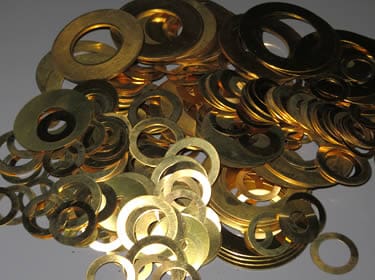Brass Shim


Brass Shims: Everything You Need to Know
Call 0121 544 5808 Today
Bespoke Manufacturing
Instant Quote Service
Worldwide Delivery
Various Gauges/Thicknesses
Bespoke Manufacturing
Instant Quote Service
Worldwide Delivery
Various Gauges/Thicknesses
What Are Brass Shims?
Brass shims are thin, precisely manufactured pieces of brass used to fill gaps, align components, or provide support in mechanical systems. These shims are available in various thicknesses, from just a few thousandths of an inch to several millimetres, making them versatile in fine-tuning mechanical tolerances.
Common Uses of Brass Shims:
- Correcting alignment in machinery.
- Absorbing wear and tear.
- Providing spacing between parts.
- Preventing metal-to-metal contact.
- Offering protection from corrosion in harsh environments.
What are the Benefits of Brass Shims?
1. Corrosion Resistance
Brass shims are highly resistant to corrosion, particularly in environments exposed to moisture or chemicals. This makes them ideal for use in plumbing, marine applications, and HVAC systems, where exposure to moisture is common.
2. Durability and Strength
Brass is a durable material that stands up to wear and tear over time. This makes brass shims an excellent choice for long-term use in automotive components, industrial machinery, and construction.
3. Malleability and Machinability Brass shims
Are easy to cut and shape, offering a high level of customisation. You can machine them into specific sizes or shapes to ensure they fit perfectly within your assembly or project. This versatility is crucial in precision engineering tasks.
4. Thermal and Electrical Conductivity
Brass is an excellent conductor of both heat and electricity, making it useful in applications where managing heat or electricity is essential. This makes brass shims a valuable asset in the electronics and aerospace industries.
5. Non-Magnetic Properties
Unlike steel shims, brass shims are non-magnetic, making them ideal for use in sensitive electronic and medical equipment, where magnetic interference could cause problems.
6. Smooth Surface Finish
Brass has a naturally smooth surface, which reduces the risk of abrasion or scratching on sensitive parts. This ensures optimal performance and longevity of components, especially in precision applications.
7. Versatility in Size and Thickness
Brass shims come in a wide range of thicknesses and sizes, providing the flexibility to meet various industry requirements, from fine-tuning tolerances in machinery to providing insulation between components.
These features make brass shims an indispensable component in industries such as automotive, aerospace, construction, and precision engineering.
Applications of Brass Shims
Brass shims are widely used across industries because of their corrosion resistance, strength, and customisability. Below are some of the most common uses:
In the automotive sector, these shims are vital for adjusting the alignment and spacing of critical components like axles, suspension systems, and transmission parts. They also help in vibration dampening, offering cushioning between parts to reduce wear.
In the aerospace industry, precision is everything. these shims are used to fine-tune the alignment of parts in engines and turbines. Their heat resistance and thermal conductivity also make them suitable for heat dissipation in high-temperature applications.
These shims offer corrosion-resistant sealing in plumbing systems, preventing leaks between pipe fittings. They also serve as gaskets or washers, ensuring tight seals in HVAC systems, while resisting moisture in these environments.
In manufacturing, these shims are used to adjust and level machines, ensuring precision in machine setup and calibration. They also protect machinery from excessive wear by preventing direct metal-to-metal contact, reducing long-term wear.
Because of their excellent electrical conductivity, these shims are used in electronic devices and electrical systems. They act as spacers and connectors, helping to manage electricity while reducing magnetic interference.
These shims are employed in the construction industry to adjust the alignment of doors, windows, and other structural elements. They can also be used to level surfaces like floors, ensuring a perfect fit in complex installations.
Challenges and Solutions in Using Brass Shims
While these shims offer a range of advantages, there are some challenges that industries may face:
- Limited Strength at High Temperatures
These shims can lose strength at elevated temperatures, making them unsuitable for certain high-heat applications. For these cases, using materials like stainless steel or higher copper-content alloys might be a better option. - Susceptibility to Dezincification
In corrosive environments, especially seawater, dezincification can weaken these shims over time. Applying protective coatings or choosing dezincification-resistant alloys can help reduce this risk. - Limited Fatigue Resistance
These shims may not perform well in applications with repeated stress or cyclic loading. For components requiring high fatigue resistance, consider using bronze or stainless steel.
FAQs About Brass Shims
Are Brass Shims Resistant to Corrosion?
Yes, these shims are naturally resistant to corrosion, making them suitable for environments exposed to moisture or chemicals, such as plumbing or marine applications.
Can Brass Shims Be Custom-Made?
Yes, these shims can be easily machined and customised to fit specific tolerances, gaps, or alignments, ensuring a perfect fit for your application.
How Do Brass Shims Compare to Steel Shims?
These shims offer better corrosion resistance and are non-magnetic, making them more suitable for applications in electronics or where magnetic interference is a concern. Steel shims, however, may offer better performance in high-stress environments.
Are Brass Shims Suitable for High-Heat Applications?
While brass has good thermal conductivity, it tends to lose strength at high temperatures. For extreme heat conditions, stainless steel may be a more appropriate choice.
Why Choose Brass Shims for Your Project?
When you need a versatile, corrosion-resistant, and durable material, bshims stand out as the ideal solution. Whether for precision engineering, plumbing, or aerospace, these shims provide a reliable and customisable optithese n to meet your exact requirements.
Their wide range of benefits – from malleability and strength to thermal conductivity and corrosion resistance – make them a top choice across industries. If you’re looking to enhance performance and ensure longevity in your applications, brass shims are the solution.
